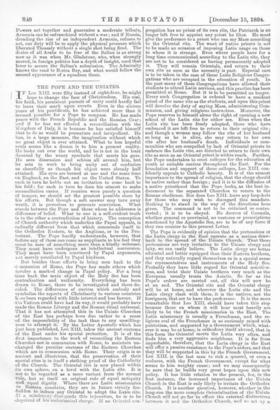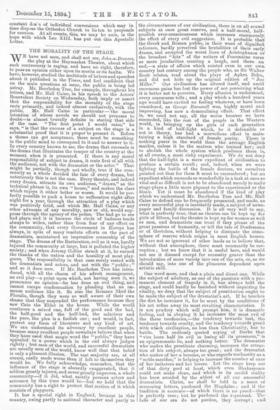THE POPE AND THE UNIATES.
IF Leo XIII. were fifty instead of eight-four, he might hope to change the face of Christendom. His zeal, this faith, his persistent pursuit of unity could hardly fail -to leave their mark upon events. Even in the sixteen years of his pontificate, he has achieved more than it seemed possible for a Pope to compass. He has made peace with the French Republic and the Russian Czar; -and if he has not effected a reconciliation with the 'Kingdom of Italy, it is because he has satisfied himself that to do so would be premature and inexpedient. He has, in a large measure, the imagination without which DO great object is ever attained. What to less hopeful souls seems like a dream is to him a present reality. 'He looks out over the world, and he is not in the least daunted by the weary spectacle that meets his gaze. -He sees dissension and schism all around him, but he sets to work to bring unity out of confusion as cheerfully as though his object were already half attained. His eyes are turned at one and the same time on England, on the East, and on the United States. To each in turn he holds out an invitation to come back to -his fold ; foe each in turn he does his utmost to make reconciliation easier. If reunion were purely a question of temper, we should Bet the greatest possible store by his efforts. But though a soft answer may turn away wrath, it is powerless to generate conviction. What -stands between the Pope and those whom he addresses is difference of belief. What to one is a self-evident truth is to the other a contradiction of history. The conception -of Church authority which underlies the Papal appeals, is -radically different from that which commends itself to 'the Orthodox Eastern, to the Anglican, or to the Pro- testant. The Pope hardly understands, however, that 'before any of these can come as suppliants to his feet they must be sure of something more than a kindly welcome. They must have undergone an intellectual conversion. 'They must have been convinced by Papal arguments, not merely conciliated by Papal kindness.
But besides these efforts to bring men back to the 3mmunion of Rome, the Pope has made others which iuvolve a marked change in Papal policy. For a long -time back the main object of the Holy See has been centralisation and uniformity. Everything has been -drawn to Rome, there to be investigated and there de- cided. The differences of custom which embody and symbolise the aspects of Christianity in various countries tve been regarded with little interest and less favour. If et'ae Vatican could have had its way, it would probably have made the Roman Liturgy and the Roman ritual universal. That it has not attempted this in the Uniate Churches of the East has perhaps been due rather to a sense of the impossibility of the task than to any unwilling- ness to attempt it. By the Letter Apostolic which has just been published, Leo XIII. takes the ancient customs of the East under his spacial protection. It is of the tirst importance to the work of reconciling the Eastern Churches not in communion with Rome, to maintain nu- ...changed the peculiar customs of the Eastern Churches which are in communion with Rome. Their origin is so ancient and illustrious, that the preservation of their epecial rites is in itself a striking proof of the Catholicity of the Church. The Oriental rite is now placed within its own sphere, on a level with the Latin rite. It is not to be regarded as a mere variant from the normal rule, but as itself an original rule of equal antiquity awe equal dignity. Where there are Latin missionaries in Eastern countries, they are in future strictly for- '-bidden to induce any Oriental to adopt the Latin rite. If a missionary disregards this injunction, he is to be ..edepritred of his ecclesiastical charge. If an Oriental con- gregation has no priest of its own rite, the Patriarch is no longer left free to appoint any priest he likes. He must give the preference to a priest who can say Mass according to the Oriental rite. The want of native priests is not to be made an occasion of imposing Latin usage on those to whom it is strange. Even where people have for a long time communicated according to the Latin rite, they are not to be considered as having permanently adopted it. They will remain Orientals, and return to their own rite as soon as the necessity is past. Especial care is to be taken in the case of those Latin Religious Congre- gations who are occupied in the education of youth. In the past many of these Congregations have allowed their students to attend Latin services, and this practice has been permitted at Rome. But it is to be permitted no longer. Every such Congregation is ordered to have a resident priest of the same rite as the students, and upon this priest will devolve the duty of saying Mass, administering Com- munion, and giving religious instruction. Moreover, the Pope reserves to himself alone the right of opening a new school of the Latin rite for either sex. Even when the Latin rite has been freely adopted, those who have embraced it are left free to return to their original rite ; and though a woman may follow the rite of her husband so long as he is alive, she may return to her own rite after her husband's death. Individuals or com- munities who are compelled by lack of Oriental priests to embrace the Latin rite, are directed to return to their own rite as soon as an Oriental priest is within reach. Further, the Pope undertakes to erect colleges for the education of youth at suitable centres throughout the East. For the foundation and support of these colleges, Leo XIII. con- fidently appeals to Catholic bounty. It is of the utmost importance to the spread of religion, that the clergy should be native rather than foreign ; and it is to the diffusion of a native priesthood that the Pope looks, as the best in- ducement to the separated Churches to return to the Roman obedience. Nor does Leo XIII. leave any loop-hole for those who may wish to disregard this mandate. Nothing is to stand in the way of the directions here given. The command is not to be criticised or contro- verted; it is to be obeyed. No decrees of Councils, whether general or provincial, no customs or prescriptions sanctioned by the Apostolic See, are to be of any force if they run counter to this present Letter.
The Pope is evidently of opinion that the pretensions at the Latin clergy in the East operate as a serious draw- back to the spread of the Uniate Church. That these pretensions are very irritating to the Uniate clergy and laity, we can easily believe. The Latin clergy are better educated and better equipped than their Eastern brethren, and they naturally regard themselves as in a special sense the representatives and instruments of the Holy See. Probably they have little regard for Oriental sensitive- ness, and treat their Uniate brethren very much as the European usually treats the Asiatic. So far as the Pope 'ii orders are carried out, all this will now be at an end. The Oriental rite and the Oriental clergy will be at home, and wherever the Latin rite and the Latin clergy clash with them, it is the natives, not the foreigners, that are to have the preference. It is the more remarkable that Leo XIII. should have taken this step because those on whom it will bear most heavily are likely to be the French missionaries in the East. The Latin missionary is usually a Frenchman, and the re- ligious zeal of the Frenchman is so curiously mixed with patriotism, and supported by a Government which, what- ever it may be at home, is orthodoxy itself abroad, that in this form the Oriental meets the Latin very often, and finds him a very aggressive neighbour. It is far from improbable, therefore, that the Latin clergy in the East will offer a passive resistance to the Pope's orders, and that they will be supported in this by the French Government. Leo XIII. is the last man to risk a quarrel, or even a coolness, with the French Government, except for what seems to him weighty cause ; and we may consequently be sure that he builds very great hopes upon this new policy. It has little relation to the present, for, in the first instance, the increased importance of the Uniate Church in the East is only likely to irritate the Orthodox Church. It is another question, however, whether in the long-run the more complete Orientalisation of the Uniate Church will not go far to efface the external distinctions between it and the Orthodox Church, and El9 set up a constant dia'a of individual conversions which may in time dispose the Orthodox Church to listen to proposals for reunion. At all events, this, we may ha sure, is the hope with which Leo XIII. has put out this Apostolic Letter.









































 Previous page
Previous page